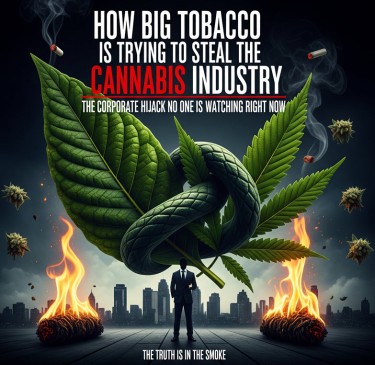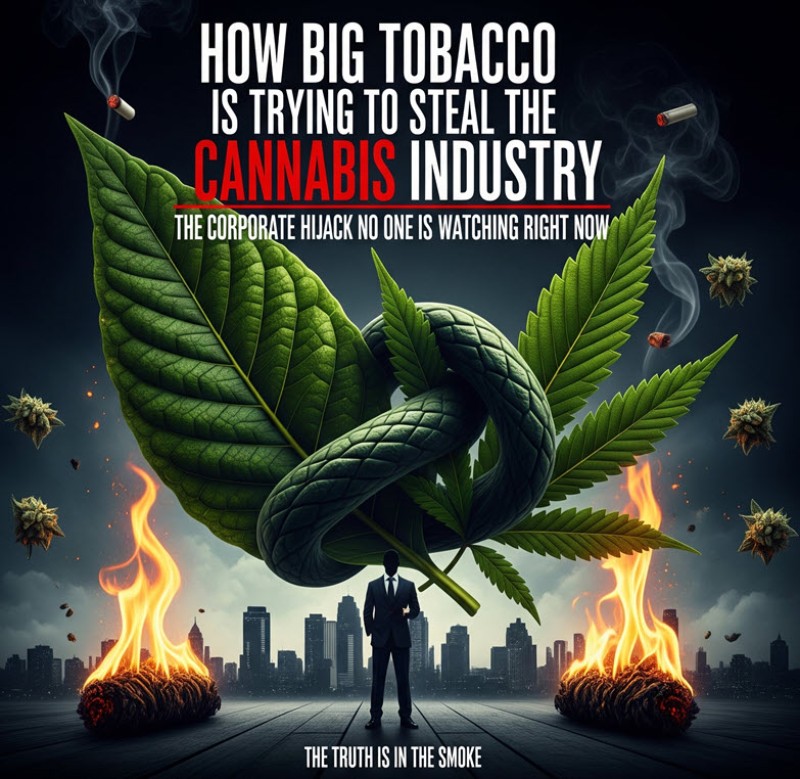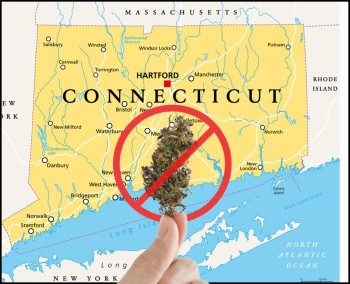
The wolves are circling the cannabis industry, and they're wearing familiar sheep's clothing. Altria Group, the tobacco giant behind Marlboro cigarettes and a century of corporate malfeasance, is positioning itself to dominate legal cannabis using the exact same playbook they used to capture and control the tobacco market in the 1990s. This isn't just corporate expansion - it's a calculated theft of an industry that millions of people fought to legalize, often at great personal cost.
Make no mistake: when Altria and other tobacco giants talk about "entering the cannabis space," they're not talking about joining the community that built this industry from underground networks and basement grow operations. They're talking about stealing it. They want to use their vast resources, political connections, and regulatory capture experience to eliminate the independent cultivators, small-scale processors, and mom-and-pop dispensaries that created the cannabis industry we know today.
This is the same company that spent decades lying about the health effects of tobacco, paying doctors to promote cigarettes, targeting children with cartoon mascots, and manipulating nicotine levels to maximize addiction. Now they want to be the stewards of cannabis legalization? It's like asking the fox to design the henhouse security system.
The most insidious aspect of Big Tobacco's cannabis strategy isn't just their corporate involvement - it's how they're using the language of reform to achieve the opposite of reform. They're funding legalization initiatives that sound progressive but contain regulatory frameworks specifically designed to eliminate competition and concentrate market control in the hands of a few mega-corporations. They're offering us legalization with corporate chains attached.
We fought for decades to end cannabis prohibition, and now we're supposed to hand the keys to the very industries that perfected the art of addicting and killing their customers for profit? This isn't just about business competition - it's about whether cannabis legalization serves the people who sacrificed for it or the corporations that profited from its prohibition.
The Altria Playbook: Déjà Vu All Over Again
Altria's approach to cannabis reads like a corporate strategy guide titled "How to Steal an Industry While Looking Like a Reformer." They're using the exact same tactics they perfected during tobacco's golden age of market manipulation, regulatory capture, and consumer deception.
First, they're positioning themselves as industry "experts" who can bring "professionalism" and "safety standards" to the "chaotic" cannabis market. This is rich coming from the company that spent decades denying that cigarettes cause cancer while secretly conducting research proving exactly that. Altria talking about safety standards is like asking a serial arsonist to lead the fire department.
The tobacco playbook starts with market research and consumer manipulation. Altria has been quietly studying cannabis consumers for years, conducting focus groups, analyzing consumption patterns, and developing marketing strategies designed to maximize dependence and profit. They're applying the same psychological manipulation techniques they used to turn casual tobacco users into pack-a-day addicts.
Next comes the regulatory capture phase. Altria is funding think tanks, lobbying groups, and political campaigns that support "responsible cannabis legalization" - which translates to legalization frameworks that require massive capital investments, complex licensing processes, and regulatory compliance costs that only established corporations can afford. They're writing the rules to exclude everyone except themselves.
The product development strategy follows tobacco's addiction-maximization model. Altria isn't interested in craft cannabis or artisanal cultivation - they're developing mass-market products designed for maximum convenience, consistent delivery, and optimized dependence patterns. Think cannabis cigarettes with precisely calibrated THC levels designed to keep customers coming back for more.
Their distribution strategy leverages existing tobacco retail networks while using regulatory arguments to eliminate cannabis-specific dispensaries. Why allow specialized cannabis retailers when tobacco shops can sell "regulated" cannabis products alongside cigarettes? It's vertical integration disguised as consumer convenience.
The marketing approach will follow tobacco's proven formula: target young adults with lifestyle branding while maintaining plausible deniability about youth marketing. Expect cannabis brands that look suspiciously like energy drink marketing, complete with extreme sports imagery and social media campaigns designed to reach teenagers through "adult-targeted" content.
Most cynically, Altria is positioning itself as a harm reduction advocate by arguing that their cannabis products will help people quit smoking cigarettes. This is the same company that spent decades increasing cigarette addiction levels, now claiming they want to help people quit the products they deliberately made more addictive. It's like a drug dealer offering to help you get clean by switching to a different drug they also happen to sell.
The endgame is market consolidation and control. Once Altria establishes market dominance through superior resources and regulatory advantages, they'll push for additional regulations that eliminate remaining competition while protecting their market position. Independent cultivators will become "unlicensed criminals," small dispensaries will become "unregulated safety risks," and homegrown cannabis will become a "public health threat."
The Regulatory Trap: Legalization as Corporate Welfare
The most dangerous aspect of Big Tobacco's cannabis strategy isn't their market entry - it's how they're manipulating the legalization process itself to create regulatory frameworks that serve corporate interests rather than public interests. They're offering us legalization, but it's legalization designed to benefit them at our expense.
Altria-backed legalization initiatives typically include provisions that sound reasonable on the surface but create insurmountable barriers for small operators. Requirements for "sophisticated laboratory testing," "pharmaceutical-grade manufacturing facilities," and "comprehensive inventory tracking systems" sound like consumer protection measures, but they're actually tools for eliminating competition.
These regulatory requirements aren't based on actual safety concerns - they're based on creating cost barriers that only large corporations can afford. A small-scale cultivator can grow excellent cannabis in a garage, but they can't afford to build a pharmaceutical-grade manufacturing facility. Independent processors can create high-quality extracts with modest equipment, but they can't afford to implement inventory tracking systems that cost more than their entire operation.
The licensing structures promoted by tobacco-backed legalization create artificial scarcity that drives up market values while limiting participation. When licenses are expensive, limited in number, and require extensive background checks, you're not creating a free market - you're creating a government-protected oligopoly. Only corporations with vast resources and political connections can navigate these systems successfully.
Vertical integration requirements force small operators out of their specialized niches by requiring them to participate in every aspect of the supply chain. A craft cultivator who excels at growing might be forced to also become a processor, manufacturer, distributor, and retailer - or lose market access entirely. This eliminates the specialized expertise that makes craft cannabis superior to mass-market products.
Local control provisions sound like community empowerment, but they're actually tools for corporate consolidation. When municipalities can ban cannabis businesses entirely, corporations use their political influence to ensure that only their preferred locations remain open while community-based businesses get shut down through local ordinances.
The taxation structures in corporate-backed legalization bills are designed to appear punitive while actually protecting established operators. High tax rates eliminate price competition from illegal markets while creating barriers for new entrants, but established corporations can absorb these costs more easily than independent operators.
Most insidiously, these regulatory frameworks include "grandfathering" provisions that protect existing operators while imposing new requirements on future entrants. This means that once Altria establishes market position, they can support additional regulations that would have prevented their own entry if applied retroactively.
Why Independent Cannabis Matters
The fight against corporate cannabis consolidation isn't just about preserving small businesses - it's about preserving the values, innovation, and community connections that make cannabis culture unique. Independent cannabis operators represent everything that Big Tobacco threatens to destroy through corporate standardization.
Craft cultivators develop unique strains, experiment with growing techniques, and prioritize quality over quantity in ways that corporate agriculture never will. These aren't just products - they're artistic expressions, genetic innovations, and agricultural achievements that represent decades of underground research and development. Altria's mass-market approach will reduce this diversity to a handful of standardized products optimized for profit rather than quality.
Independent processors and manufacturers create innovative products that respond to consumer needs rather than corporate profit margins. They develop specialized extracts, unique edibles, and novel delivery methods because they're serving communities rather than shareholders. Corporate cannabis will prioritize products that maximize dependence and repeat sales rather than products that provide optimal therapeutic benefits.
Local dispensaries serve as community hubs where customers receive personalized recommendations, education, and support from knowledgeable staff who understand cannabis as medicine and culture, not just commodity. Corporate cannabis retail will follow the tobacco model of convenience-store distribution where products are sold by minimum-wage employees with no cannabis knowledge or community connection.
The medical cannabis community represents perhaps the most vulnerable population in this corporate takeover. Patients who rely on specific strains, precise dosing, and specialized products will find their needs subordinated to mass-market preferences. Corporate cannabis prioritizes recreational customers with higher profit margins over medical patients with specific therapeutic requirements.
Cannabis culture itself - the festivals, advocacy groups, educational organizations, and social networks that sustained the reform movement through decades of prohibition - depends on independent operators who share these values. Corporate cannabis views culture as marketing opportunity rather than community foundation.
The economic justice arguments for independent cannabis are equally compelling. Cannabis legalization was supposed to provide opportunities for communities harmed by prohibition, particularly communities of color who bore the brunt of enforcement. Corporate consolidation ensures that these opportunities flow to wealthy white executives rather than the people who paid the price for prohibition.
Innovation in cannabis comes from passionate individuals experimenting with new ideas, not corporate research departments optimizing for quarterly profits. The diversity of products, strains, and approaches that characterizes legal cannabis markets exists because independent operators have freedom to innovate. Corporate standardization will kill this innovation in favor of predictable mass-market products.
Fighting Back: Cannabis for the People
The battle for cannabis isn't over just because legalization passes - in many ways, it's just beginning. The real fight is ensuring that legalization serves the people who fought for it rather than the corporations that opposed it. This requires vigilance, organization, and strategic thinking about what kind of cannabis industry we want to create.
First, we need to scrutinize every legalization initiative for corporate capture mechanisms. Any bill that requires massive capital investments, complex licensing processes, or regulatory frameworks that favor large operators over small ones should be viewed with suspicion. True cannabis reform creates opportunities for everyone, not just corporations with vast resources.
Support for independent operators must be built into legalization from the beginning. This means reasonable licensing fees, accessible entry requirements, and regulatory frameworks that protect quality and safety without creating insurmountable barriers. Social equity programs must be meaningful and enforceable, not tokenistic gestures that get eliminated once corporate interests are established.
Local advocacy remains crucial even after statewide legalization. Municipal regulations often determine whether independent operators can survive in practice, regardless of state law. Supporting local candidates who understand cannabis issues and opposing municipal bans helps preserve space for community-based businesses.
Consumer education about the differences between corporate and independent cannabis helps create market demand for authentic products. When consumers understand that craft cannabis represents superior quality, innovation, and community values, they're more likely to support independent operators even when corporate alternatives are more convenient or cheaper.
Direct action against corporate cannabis includes boycotts of tobacco-backed brands, support for independent operators, and political pressure on legislators who accept tobacco industry lobbying money. Every purchase decision is a vote for the kind of cannabis industry we want to create.
Building coalitions between cannabis advocates and other movements fighting corporate consolidation creates broader political power. The fight against Big Tobacco's cannabis takeover is part of larger struggles against corporate concentration in agriculture, healthcare, and consumer goods.
The Sticky Bottom Line: Whose Weed Is This Anyway?
The war for cannabis isn't between prohibition and legalization anymore - it's between corporate control and community ownership. Altria and Big Tobacco want us to trade prohibition chains for corporate chains, replacing government control with industry control while maintaining the same exclusion of ordinary people from cannabis commerce.
This isn't just about business models or market structure - it's about values. Do we want cannabis commercialization to follow the tobacco model of addiction maximization, youth targeting, and consumer manipulation? Or do we want cannabis markets that prioritize quality, community, and individual empowerment?
The people who fought for cannabis legalization - the advocates who faced arrest, the patients who risked prosecution, the cultivators who developed genetics underground, the communities destroyed by prohibition - these people deserve to benefit from legalization. They shouldn't be pushed aside so tobacco executives can profit from their sacrifices.
Big Tobacco's cannabis strategy represents everything wrong with American capitalism: use vast resources to capture regulatory processes, eliminate competition through bureaucratic barriers, and extract maximum profit while providing minimum value. It's corporate colonization disguised as market participation.
The solution isn't opposing all commercial cannabis - it's fighting for commercial cannabis that serves people rather than corporations. We need legalization that creates opportunities for independent operators, prioritizes consumer choice and safety over corporate profits, and maintains the innovation and diversity that characterizes authentic cannabis culture.
Society paid the price of prohibition through mass incarceration, medical deprivation, and lost opportunities. When legalization comes - and it's coming everywhere eventually - it must settle that debt by providing pathways for ordinary people to participate in cannabis commerce. Anything less is theft of the victory that millions of people earned through decades of resistance.
Altria can keep their cigarettes and their manipulation tactics. Cannabis belongs to the people who fought for it, grew it, used it, and believed in it when believing meant risking everything. We won't let tobacco companies steal what we built just because they have more money and better lawyers.
The message to Big Tobacco is simple: Cannabis isn't yours to take. We'll legalize it ourselves, on our terms, for our communities. Find your own industry to destroy - this one's already spoken for.







